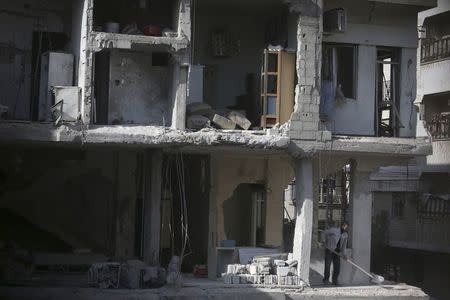European Union backs U.N. plan for Syrian truce
By Adrian Croft and Robin Emmott
BRUSSELS (Reuters) - European Union foreign ministers threw their weight behind a U.N. plan for a truce in the northern Syrian city of Aleppo on Monday, saying it offered a glimmer of hope for a political solution to the three-and-a-half year old civil war.
The EU also said it was ready to work with Iran and Russia to try to drive forward a broader political process that could lead to a settlement of a war that has killed around 200,000 people.
U.N. peace envoy Staffan de Mistura briefed the ministers on Sunday evening on his plan for a "freeze in the fighting" in Aleppo to try to get humanitarian assistance into the city that is split between opposition fighters and government troops.
"The EU is committed to fully support ... de Mistura's efforts to achieve a strategic de-escalation of violence as a basis for a broader sustainable political process," EU foreign ministers said in a statement after discussing the plan in Brussels on Monday.
The EU could support de Mistura's efforts for example by helping to rebuild local administration and restoring basic services in areas where fighting had calmed down, they said.
EU foreign policy chief Federica Mogherini said ministers had also agreed to "work with all the actors ... that can be part of the solution to the Syrian crisis, namely big Gulf countries, starting from Saudi Arabia, but also Iran and Russia."
De Mistura sees his proposed truce in Aleppo as a stepping stone in a political process that has been blocked for years.
The Syrian opposition, as well as some diplomats and analysts, say the initiative is risky and that Aleppo could face the same fate as the city of Homs, where government forces have largely regained control.
Separately, the European Commission and Italy agreed on Monday to launch a regional fund for Syria, with an initial 23 million euros (£18.55 million), designed to mobilise more aid for the Syrian refugee crisis.
Mogherini also announced she would visit Baghdad and Arbil, the capital of Iraq's semi-autonomous Kurdish region, next week for talks with officials. Iraq, with the support of a U.S.-led coalition, is battling Islamic State insurgents that have seized territory in Iraq and Syria.
(Editing by Dominic Evans and Robin Pomeroy)





